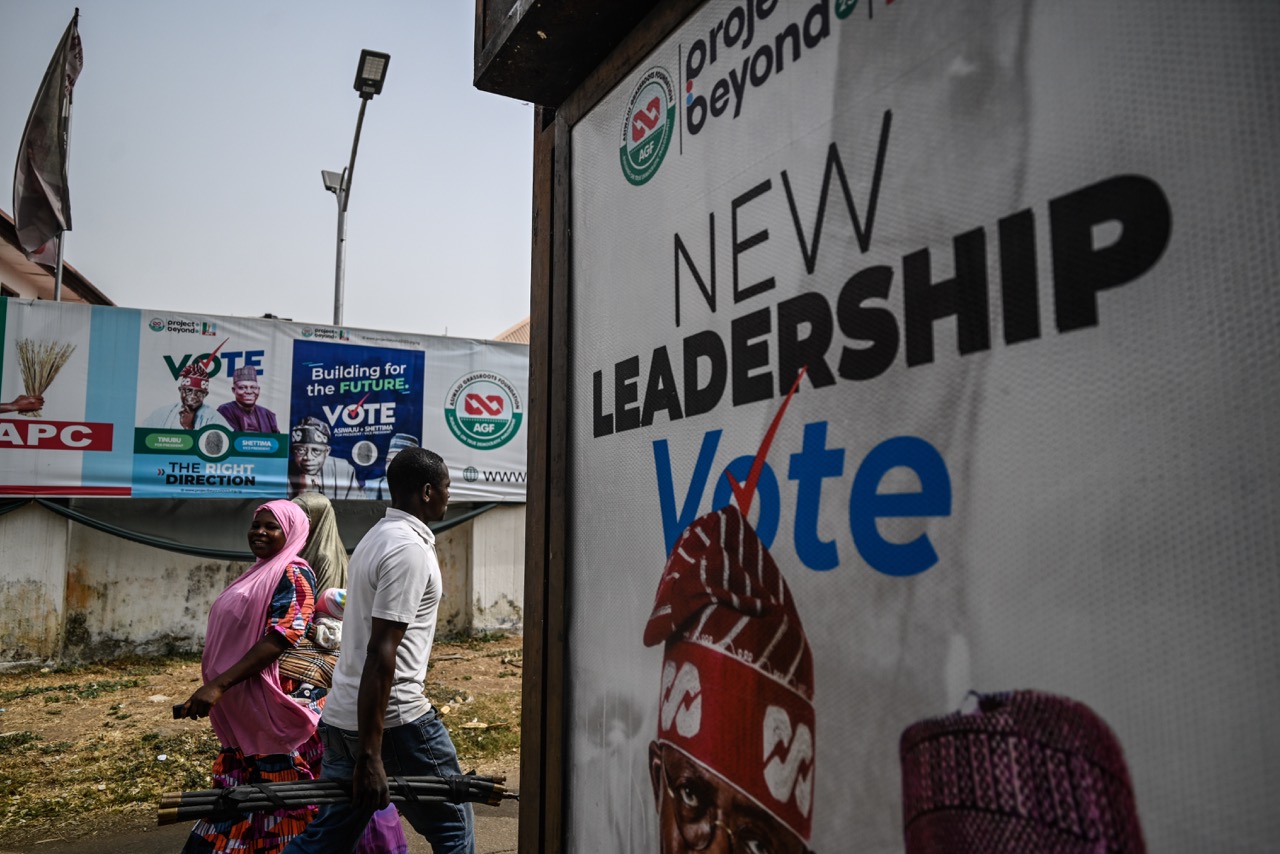The Western fetishization of elections unintentionally contributes to the erosion of faith in democracy among Nigerian citizens.
[ Link naar tekst in het Nederlands onder dit artikel ]
Normally, I see few Westerners in Nigeria, West Africa, where I live and work as a journalist. Once every four years, however, when it is time for presidential elections, the international circus shows up. Observers and journalists fly in to cast their sagacious eye over the electoral process–only to leave again just as swiftly. Such was the case in late February, when Nigeria went to the polls to elect a new president. In doing so, these observers do more harm than good to the democracy they claim to guard: the Western fetish of the ballot box unintentionally contributes to the erosion of faith in democracy among Nigerian citizens.
Imagine: Brabanders from the Dutch South living in Amsterdam being denied entry to the polling station under the watchful eye of the police because they are not native Amsterdammers. Or armed men raiding polling stations in other Dutch cities like Arnhem, Heerlen, and Den Helder, invalidating votes in those locations. Or across Groningen, voters standing in front of a closed door while polling officials do not show up until half an hour before the official ballot box closes. Or the King’s Commissioner of Zeeland visiting the polling stations in his province with a military bodyguard to personally change the results.
If even one such incident occurred in the Netherlands, the entire electoral process would be called into question, as would the state of the country’s democracy. Yet these are exactly the kind of scenes that took place in Nigeria during the last elections. Instant abuses that were also noticed by the Western observers in their reports – albeit in veiled, diplomatic language.
But no political consequences followed these incidents. The day after the elections, the United States, the United Kingdom, and France congratulated presidential candidate Bola Ahmed Tinubu, who was declared the winner by Nigeria's INEC electoral council. The opposition should just go to court if it disagrees, was the message that studiously avoided any value judgment on the disastrous ballot.
Africa's largest economy
Whether it is political cowardice or the economic pragmatism of wanting to do business with Africa's largest oil producer, the message to Nigerian voters is clear: one democracy is not the other. And in the case of Nigeria, Africa's largest economy, the bar is low.
This particularly frustrates those under 34 who registered as voters en masse in the run-up to these national elections. This generation never bothered to register to vote because they knew from experience that fraud and violence in Nigeria determine election results – not the ballots that end up in the box. The introduction of new technology during the electoral process dared this group to believe for the first time that their vote would make a difference. That hope was subsequently dashed.
A unique mobilisation of a previously apolitical generation was thus undone. The question is whether these young voters can ever be enthused about voting again. In a country where 70 per cent of the population is under 30, this poses a further threat to an already eroded democracy.
For that is the second objection to Western one-day fly-by observation of the Nigerian elections: a ballot is only a snapshot. Many foreign journalists board the plane home the day after the elections. But reporting only on the ballot makes a caricature of democracy, as if it means nothing more than voting and then shutting up for four years.
This approach completely ignores the political power play that has been going on for decades in Africa's most populous country, which is all about money. Politicians buy loyalty, votes, and judges – from the same court where the opposition is supposed to get its due. They pay journalists and editors-in-chief, and hire voting cattle and thugs. They spend millions to play the ballot box to their advantage. These are investments to be recouped in the following four years.
Pocketing
According to the Nigerian policy think tank Agora Policy, the Nigerian treasury misses out on almost 10 billion euros in revenue every year because 60 per cent of payments for government contracts are skimmed and pocketed: that is how politicians claim back the investments made for (re)election. In this sense, the so-called democratic process directly contributes to Nigeria's pervasive corruption, at which Westerners then shake their heads.But the most devastating long-term effect of the way Nigerian parties fight for power is the role that politicians allot to shady forces like agbero, or area boys, in the process. These street gangs are paid to threaten and, if necessary, exert violence to help or keep their political bosses in power.
After the elections, the political money tap closes for the agbero, but this violently governing informal force must be fed. So police turn a blind eye as they extort contractors in residential areas, extort protection money from shopkeepers, steal from motorists with breakdowns, or demand money from Western camera crews coming to film in Lagos. In Lagos alone, area boys collect more informal taxes than most other Nigerian states officially generate in revenue. Facilitated by the government, agbero terrorise ordinary citizens, and that violent system burrows deeper into Nigerian society after each round of elections.
These are the long-term effects of the democratic charade for which the Western caravan travels to Nigeria once every four years. After the winner is declared, the procession travels on. But at least as relevant as who won is the question of what lasting damage the flawed electoral process has done. If you fail to put that into perspective, you will also fail to understand what is actually going on in Africa's largest democracy in the four years that follow.
This article was first published in Dutch in NRC daily newspaper.
Femke van Zeijl is a correspondent in Nigeria and the author of The DIY Society, a book about life in Lagos.


